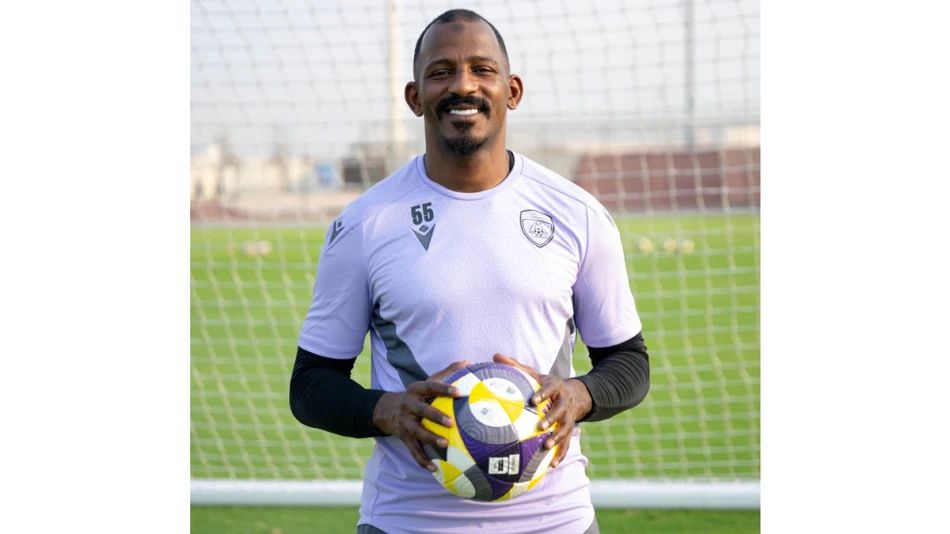
Maajid Nasir: Amateur League Challenging and Evolving, Mahdi Ali Lauded as Top Coach
UAE Football Legend Backs Foreign Goalkeeper Reform as Andrea Pirlo Arrival Signals New Era
Former UAE national team goalkeeper Majed Nasser has thrown his weight behind the controversial decision to allow foreign goalkeepers in Emirati leagues, arguing it will elevate domestic talent rather than sideline it. Speaking after his recent move to Al Hamriya FC, the veteran keeper also hailed Andrea Pirlo's appointment at United FC as a "turning point" that could transform the country's first division into a genuine development pathway.
Foreign Talent: Competition Breeds Excellence
Nasser's endorsement of the foreign goalkeeper policy puts him at odds with traditionalists who fear it could limit opportunities for Emirati players. The 40-year-old keeper, who has represented his country in multiple Gulf Cup tournaments, believes the opposite will happen.
"I've been calling for foreign goalkeepers to be allowed for over 10 years because of the technical benefits I could see," Nasser explained. "In the end, the best player will secure their place in the starting lineup, regardless of nationality."
This approach mirrors successful models in other Gulf states. The UAE's regional rival Saudi Arabia has increasingly opened its leagues to foreign talent, contributing to improved performances in continental competitions. Qatar's similar strategy helped develop a generation of players who performed creditably at the 2022 World Cup.
The Pirlo Factor: Star Power Meets Development
The arrival of Andrea Pirlo, the Italian midfield maestro and former Juventus coach, at United FC represents an unprecedented coup for UAE's first division. Nasser sees this as validation of the league's growing ambitions and professionalism.
"The first division has become much stronger and more competitive in recent seasons," he noted. "Matches are more intense and pressurized, with teams led by highly experienced coaches."
Pirlo's appointment follows a trend of high-profile international coaches working in the UAE, from Roberto Mancini's stint with the national team to various European coaches in the professional league. For investors and football development officials, such appointments signal the UAE's serious intent to establish itself as a regional football hub.
Al Hamriya: Ambition Over Comfort
Nasser's decision to join Al Hamriya, despite receiving offers from top-tier professional clubs, reflects his hunger for new challenges. The club's clear objective—promotion to the UAE Pro League—convinced him to sign without even reviewing contract details.
"Al Hamriya is an ambitious club, and I have an even greater passion to achieve new accomplishments with them," he said. The move suggests that ambitious first-division clubs are increasingly attractive to established players, potentially reshaping the competitive landscape.
Fujairah: The Goalkeeper Factory
Nasser's roots in Fujairah highlight an interesting geographical pattern in UAE football development. The emirate has produced a disproportionate number of quality goalkeepers, including Nasser himself, Ali Khaseif, and Fahad Al Dhanhani.
"Fujairah continues to supply clubs and national teams with goalkeepers," Nasser observed, revealing he personally monitors the emirate's goalkeeper academy where five 12-year-old talents show exceptional promise.
This regional specialization mirrors how certain areas become hotbeds for specific positions—similar to how certain regions in Brazil are known for producing particular types of players, or how Iceland's systematic approach to coaching development transformed their national team prospects.
Legacy and Leadership: The Mahdi Ali Era
When discussing the coaches who shaped his career, Nasser reserved special praise for UAE national team coach Mahdi Ali, calling him "everything in my career." This endorsement carries weight given Nasser's experience under various international coaches, including French coach Bruno Metsu and Romanian Olăroiu Cosmin at club level.
The continuity of local coaching talent like Mahdi Ali, combined with strategic international appointments like Pirlo, suggests the UAE is developing a balanced approach to football development—leveraging global expertise while maintaining local identity.
Market Implications: Investment and Infrastructure
For football investors and development agencies, the trends Nasser describes point to a maturing market. The willingness of established players to choose ambitious first-division clubs over comfortable top-tier positions indicates growing investment and professionalism at lower levels.
The integration of foreign talent, high-profile coaching appointments, and regional specialization in player development all suggest the UAE is building sustainable football infrastructure rather than relying solely on expensive foreign imports—a more economically viable long-term strategy than approaches seen in some other Gulf states.
Nasser's journey from accidental goalkeeper—he was originally a striker who filled in during an injury crisis—to national team stalwart embodies the kind of organic development that could flourish under the UAE's evolving football ecosystem.
Most Viewed News

 Sara Khaled
Sara Khaled






